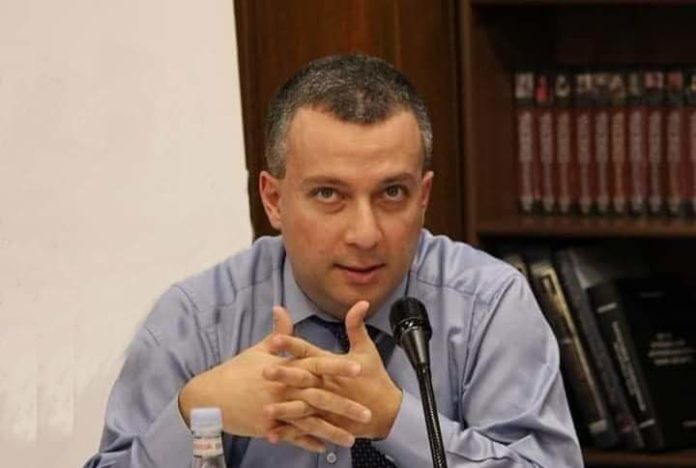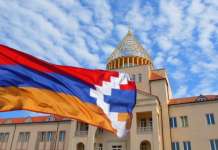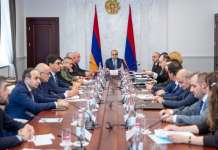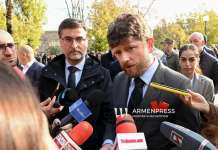By Benyamin Poghosyan published in The Armenian Mirror of Spectator
On October 26, 2024, parliamentary elections were held in Georgia. Long before election day, they were called the most crucial Georgian elections since the 2003 Rose Revolution. Opposition parties presented the election as a choice between Russia and Europe, while the ruling Georgian Dream Party described it as a choice between peace and war. In both cases, geopolitics played a significant role.
The opposition accused the Georgian Dream of steering Georgia away from European integration. At the same time, the government claimed that the opposition sought to open a second front against Russia, transforming Georgia into another Ukraine. Georgian Dream even displayed posters on Tbilisi streets contrasting images of a peaceful Tbilisi with war-ravaged Ukrainian cities.
Recent actions by the Georgian government, including the passage of a law on transparency of foreign influence and an anti-LGBT propaganda law, have strained Georgia’s relations with the West. The European Union halted the accession process and canceled funding from the European Peace Facility, while the United States imposed sanctions on several Georgian officials. The opposition used these developments to allege that the ruling party sought closer ties with Russia. Meanwhile, Georgian Dream leaders attributed anti-Georgian actions to an unspecified “Global War Party.”
The elections occurred amid positive developments in the Georgian economy, which saw substantial growth in 2022, 2023, and the first half of 2024, largely driven by Russian migration and re-exports to Russia. The government cited this economic growth to justify its strategic decision not to join anti-Russian sanctions, arguing that it had ultimately raised living standards for Georgians, which, it said, was the government’s primary responsibility.
According to the Georgian Central Election Commission, Georgian Dream won the election with about 54% of the vote. Four opposition blocks won more than 5% of the vote, the threshold for achieving representation in Parliament. The Coalition for Change, composed of former leaders from the United National Movement (the former ruling party), received 11%. Unity to Save Georgia, led by the United National Movement, won about 10%. Strong Georgia, led by Lelo for Georgia, won nearly 9%, while For Georgia, led by former Prime Minister Giorgi Gakharia, took close to 8%. The official results showed that Georgian Dream’s share was slightly lower than Gorbi exit polls commissioned by the pro-government Imedi TV. The official results contrasted sharply with exit polls from HarrisX (for the pro-opposition Mtavari Arkhi TV) and Edison Research (for opposition-leaning Formula TV), which projected the opposition as winners.
All four opposition groups that entered Parliament refused to recognize the election results. President Salome Zurabishvili, a critic of the Georgian Dream, also refused to acknowledge the results, alleging large-scale election fraud, and called for a protest rally on October 28, which brought thousands in front of the parliament building.
The joint observation mission from the Organization for Security and Cooperation in Europe (OSCE)’s Office for Democratic Institutions and Human Rights, the OSCE Parliamentary Assembly, the Parliamentary Assembly of the Council of Europe, the NATO Parliamentary Assembly, and the European Parliament reported irregularities during the election campaign, noting that the process was marred by an uneven playing field, pressure, and tension, although voters had a wide choice. United States President Joe Biden expressed his alarm at the democratic backsliding in Georgia, saying that Georgia’s October 26 parliamentary elections were marred by numerous recorded misuses of administrative resources as well as voter intimidation and coercion, and calling on the Georgian government to conduct a transparent investigation into the election irregularities. Secretary of State Antony Blinken supported calls from both international and domestic observers for a full investigation into election-related violations. He expressed specific concerns about the pre-election environment and underscored the need for transparency in the electoral process.
European Council President Charles Michel called on the Central Election Commission and other bodies to investigate all election-related violations. He urged Georgia’s leaders to reaffirm their commitment to European integration. On October 28, ministers from 13 European Union member countries issued a joint statement condemning all violations of international norms for free and fair elections, sharing the observers’ concerns, and calling for an impartial investigation and remedies for the confirmed violations.
Meanwhile, late on October 26, the Hungarian prime minister, Viktor Orban, congratulated the Georgian government on its victory, with congratulations from Azerbaijan’s president and Armenia’s prime minister following on October 27. Prime Minister Orban arrived in Georgia on October 28 and met with the Georgian prime minister on October 29. Turkey’s and UAE’s presidents also congratulated the prime minister of Georgia.
Following the elections, Georgia entered a political crisis, recalling the post-election unrest of the 2020 parliamentary elections, when all opposition parties that crossed the threshold refused to take their seats in Parliament. At that time, a compromise was reached through mediation by Charles Michel. The stakes are higher now, and geopolitics plays a more critical role. Although future developments are uncertain, the Georgian Dream appears positioned to retain power for the next four years.
Why These Elections Matter for Armenia
First, Georgia is Armenia’s primary gateway for trade with the world, as roughly 70% of Armenia’s exports and imports pass through Georgia. Georgia also provides Armenia with a land route to Russia and access to the Black Sea. Thus, any long-term political instability destabilizing Georgia could affect Armenia’s economy.
Beyond economic ties, Georgia’s foreign policy direction and its relations with the West are critical for Armenia. Yerevan is pursuing a policy of foreign diversification, deepening cooperation with the EU and the US. This includes signing the New Partnership Agenda with Brussels in early 2025 and transforming the US–Armenia strategic dialogue into a strategic partnership. However, with Russia–West relations at their lowest since the Cold War and Iran–West relations tense, Armenia’s success in strengthening ties with the West depends on the regional balance of power.
Should relations between Georgia and the West continue to deteriorate — and if other regional players such as Russia, Turkey, Azerbaijan, and Iran oppose greater Western engagement — this could complicate Armenia’s cooperation with the West and force Yerevan to adjust its foreign policy.












